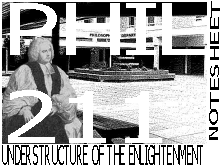 Descartes 3
Descartes 3 Descartes 3
Descartes 3The Revolutionaries
Machiavelli (1469 - 1527)
Bacon (c1561 - 1626)
Galileo (1564 - 1642)
Hobbes (1588 - 1679)
Descartes (1596 - 1650)
Boyle (1627 - 1691)
The Scholastic / Aristotelian 'form' :
whatever it is that makes a parcel of matter a thing of a particular kind. (Approx.)
In perception our intellect grasps a form
This theory is a response to the question How can the immaterial (soul) have dealings with the material?
For Scholastics, the relationship between intellect and something seen is like the relationship between intellect and something the intellect has understood.
Perception is just one example. The notion of a form
played a similarly central role in other kinds of what we today subsume under
'thinking': eg imagining, planning, meditating, dreaming, and so on.
It was also central to 'knowing'.
The Ancient conception was to think of 'knowing'
as relating the knower to objects (eg Platonic Forms). This persists to an extent
even with Bacon (Francis)
The hylomorphic framework was finally overthrown by the generation following Bacon.
With Descartes leading the way, the new thinkers drew screen around the human being, as round a hospital patient. From that point on, the shadows cast on the screens by objects beyond had to take the place of the direct communion with the ordinary things around us that had been assumed before.
The six objectors:
1. Johan de Kater ('Caterus'). Dutch theologian.
2. Friar Marin Mersenne. Friend. Correspondent.
3. Thomas Hobbes. English philosopher, who was in France in 1640 ('I was the
first of those that fled').
4. Antoine Arnauld. 'Brilliant young' theologian, to become most known through
his correspondence later with Leibniz.
5. Pierre Gassendi. Philosopher.
6. Mersenne. A second batch.
Caterus' objection and Descartes' reply.
Caterus:
'What is an idea? It is the thing thought of itself in so far as that is "objectively in the understanding." But what is "existing in the understanding"? As I was taught, it is simply being the object of an act of thought, which is merely an external attribute of the thing and adds no reality to it.' Descartes, Meditations, First Objections, (Johan de Kater). I use here the translation used by Kenny, Descartes, p.115. (Cottingham p.132.)
Descartes replies:
'Now I wrote that an idea is the thing which is thought of in so far as it has objective being in the intellect. But to give me an opportunity of explaining these words more clearly the objector pretends to understand them in quite a different way from that in which I used them. "Objective being in the intellect", he says, "is simply the determination of an act of the intellect by means of an object, and this is merely an extraneous label which adds nothing to the thing itself." Notice here that he is referring to the thing itself as if it were located outside the intellect, and in this sense "objective being in the intellect" is certainly an extraneous label; but I was speaking of the idea, which is never outside the intellect, and in this sense, "objective being" simply means being in the intellect in the way in which objects are normally there. for example, if anyone asks what happens to the sun through its being objectively in my intellect, the best answer is that nothing happens to it beyond the application of an extraneous label which does indeed " determine an act of the intellect by means of an object". But if the question is about what the idea of the sun is, and we answer that it is the thing that is thought of, in so far as it has objective being in the intellect, no one will take this to be the sun itself with this extraneous label applied to it. "Objective being in the intellect" will not here mean "the determination of an act of the intellect by means of an object", but will signify the objects being the intellect in the way in which its objects are normally there. By this I mean that the idea of the sun is the sun itself existing in the intellect - not of course formally existing, as it does in the heavens, but objectively existing, i.e. in the way in which objects normally are in the intellect. Now this mode of being is of course much less perfect than that possessed by things which exist outside the intellect; but, as I did explain, it is not therefore simply nothing.' Descartes, Meditations, First Replies; Cottingham p. 132,3.
Decartes defended the idea of the mind as a unity, but did not agree that ideas were necessarily representational.
'An idea is whatsoever is the object of the understanding when a man thinks' (Locke).
Rorty explaining the Cartesian mind:
' a single inner space in which bodily and perceptual sensations [...] mathematical truths, moral rules, the idea of God, moods of depression, and all the rest of what we now call 'mental' were objects of quasi-observation.'
Richard Rorty, Philosophy and the Mirror of Nature, Blackwell, Oxford, 1980, p.50.